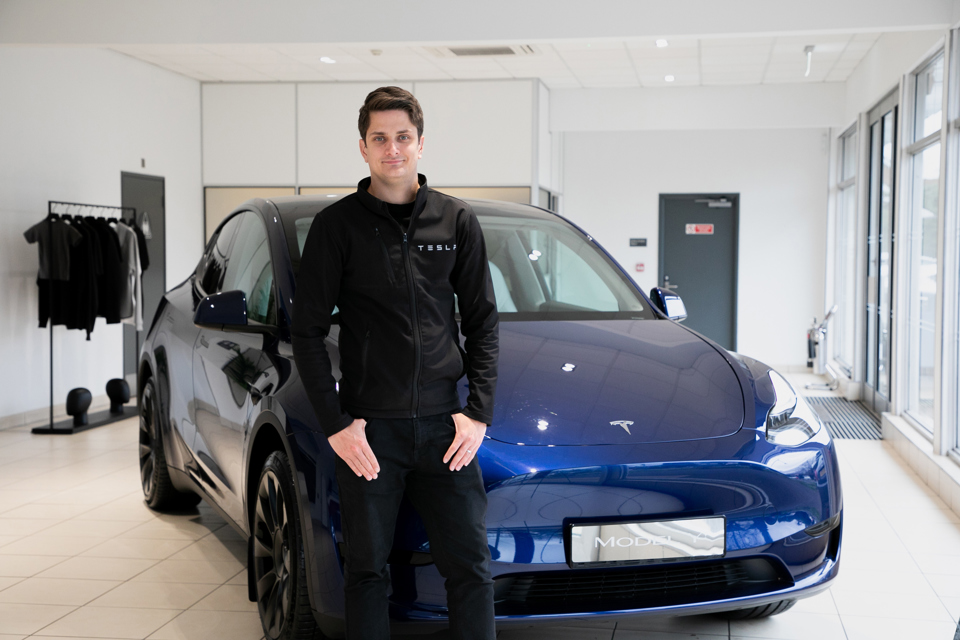With manufacturers calling for more incentives to help drive the adoption of electric vehicles (EVs), particularly in the retail market, Tesla says a range of measures could be introduced.
The Government says it will launch a 'fast track' consultation on EV sales targets in the zero emission vehicle (ZEV) mandate after mounting pressure from the auto industry.
Mark Smith (pictured above), head of fleet sales for Tesla in the UK, stressed that there wasn’t one “quick fix” to help accelerate the move away from diesel and petrol vehicles, but he said that fiscal incentives can help drive adoption.
“The biggest thing that is within the industry’s control is to give everyone the opportunity to experience an EV,” he told delegates at the annual Vehicle Remarketing Association (VRA) conference, last week.
“We should make it easier and more accessible for customers to experience and myth-bust by actually living with a car.”
The ZEV mandate requires more than a fifth (22%) of cars and 10% of vans sold by manufacturers to be electric this year.
It becomes tougher each year ahead of a complete ban on the sale of new diesel and petrol cars from 2030.
The Department for Transport (DfT) held crunch talks with car manufacturers last month about the challenges they are facing with ramping up EV sales, with retail demand still proving to be a sticking point and the fleet industry still representing the vast majority of business.
While almost 300,000 new EVs have reached the roads in 2024, according to the Society of Motor Manufacturers and Traders (SMMT), this represents 18.1% of the market – an increase on 2023, but still significantly short of the 22% target for this year and of the 28% which must be achieved in 2025 under the mandate.
Professor David Bailey, from Birmingham Business School, told delegates at the VRA conference: “EV sales are still growing, but driven very much by the business sector, which has generous tax breaks in terms of benefit in kind, and through salary sacrifice. Private sales have largely stalled.”
He explained: “Battery electric prices are coming down, but not as quickly as anticipated and probably won’t get down to parity with petrol/diesel until 2027.
“That's the problem. The upfront costs of buying a battery electric car still put people off. The UK Government, I think, acted too soon in cutting subsidies to buy them. The charging infrastructure is also a major deterrent.”
Bailey (pictured below) believes that there are four key actions the Government could take to support the UK motor industry through the process of electrification.

He said: “We’d like to see more flexibility surrounding the ZEV mandate… substantial investment in public charging infrastructure, incentives for retail buyers to adopt EVs, and a clear and effective industrial strategy. All of these, taken together, should help to speed electrification.”
The plug-in car grant (PiCG) was first introduced in 2010, when it offered up to £5,000 off a car with CO2 emissions of less than 75g/km.
The Government completely withdrew the funding for electric cars offered through the plug-in car grant, which was then worth up to £1,500 off an EV, in 2022.
To help drive greater EV adoption rates in the retail sector through the introduction of a new subsidy, Bailey says Government could re-introduce the grant or cut VAT on EV purchases.
“I think there will be things that the Government will have to do to stimulate the industry, and that will cost them,” he added.
He also argues that electricity needs to be cheaper. “Electricity is way too expensive in this country,” he said.
Future-proofing EVs
One way Tesla is also trying to get more drivers to consider switching to electric, and to protect its own residual values (RVs), is the introduction of a certified pre-owned scheme for its used vehicles.
Smith said: “We’ve very much been a new car business since the outset, and we’re now transitioning to that new and used car business.
“Ultimately, everything we do should be related back to our mission of accelerating the transition to sustainable energy, and that’s regardless of who sells that car; whether that’s us, or whether that’s an independent franchise, whoever that is, we should be supporting them.”
He added: “We’re looking at a number of different ways of how we can support the wider (used) market.”
Smith also highlighted that “future-proofing” EVs through over-the-air updates was something buyers needed to be educated about and how the vehicles can be “improve over time”.
“It’s not necessarily selling the car; it’s about selling peace of mind,” he said.





















Login to comment
Comments
No comments have been made yet.